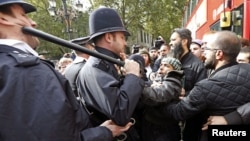LONDON —
Five men, including Islamist cleric Abu Hamza, are to be extradited from Britain to face terror charges in the United States. On Friday the High Court in London rejected the men’s last-minute appeal to block their removal.
Friday’s decision brings a drawn-out eight-year legal battle to an end.
The most high-profile of the five is Abu Hamza, an Egyptian-born former imam, who uses a distinctive hook in place of his right hand. He is wanted in the United States on a number of charges, including attempting to set up a training camp for militants in the northwest state of Oregon and helped al-Qaida seize hostages in Yemen.
His lawyer had argued that Hamza needed a brain scan before extradition should go ahead.
Two of the men, Khaled al-Fawwaz and Adel Abdul Bary are accused of playing a role in the 1998 bombing of two U.S. embassies in east Africa.
Babar Ahmad and Syed Ahsan are wanted on charges of running a website that encouraged terrorism. The website was run out of London but hosted in the U.S.
Ahmad’s father Ashfaq spoke outside the courthouse Friday. He said he felt let down by one of the world’s oldest democracies.
"All the evidence against him was available in this country here so I can't understand why at he should have been sent there. He should have been tried here and that is my main message," he said.
Britain’s Home Office welcomed the court’s decision and said it’s working to extradite the men as soon as possible.
The U.S. Embassy in London said it was “pleased” with the decision.
Roger Smith, director of Justice, a British human rights organization, says the extraditions have created some controversy in Britain, in part because of the U.S. prison system.
The five men are to be sent to a so-called "supermax" prison in the state of Colorado, where the country’s most notorious terrorists are often sent.
"One of the issues in this case was whether it was acceptable for the U.K. to send someone to the U.S. when they would be put in a supermax prison and subjected to conditions which to European eyes are frankly just not acceptable," said Smith.
The European Human Rights Court ruled that the five men would not recieve "ill treatment" in super-maximum security prisons.
Smith says another concern in Britain is that there is an imbalance in the extradition agreement between Britain and the United States.
"We interpret it as meaning automatic extradition of people requested by the U.S. and the U.S. has a provision in its constitution which requires the proof of probable cause before someone is extradited. So it is often said that we need to re-balance the agreement," he said.
The five men are expected to be flown to the United States immediately.
Friday’s decision brings a drawn-out eight-year legal battle to an end.
The most high-profile of the five is Abu Hamza, an Egyptian-born former imam, who uses a distinctive hook in place of his right hand. He is wanted in the United States on a number of charges, including attempting to set up a training camp for militants in the northwest state of Oregon and helped al-Qaida seize hostages in Yemen.
His lawyer had argued that Hamza needed a brain scan before extradition should go ahead.
Two of the men, Khaled al-Fawwaz and Adel Abdul Bary are accused of playing a role in the 1998 bombing of two U.S. embassies in east Africa.
Babar Ahmad and Syed Ahsan are wanted on charges of running a website that encouraged terrorism. The website was run out of London but hosted in the U.S.
Ahmad’s father Ashfaq spoke outside the courthouse Friday. He said he felt let down by one of the world’s oldest democracies.
"All the evidence against him was available in this country here so I can't understand why at he should have been sent there. He should have been tried here and that is my main message," he said.
Britain’s Home Office welcomed the court’s decision and said it’s working to extradite the men as soon as possible.
The U.S. Embassy in London said it was “pleased” with the decision.
Roger Smith, director of Justice, a British human rights organization, says the extraditions have created some controversy in Britain, in part because of the U.S. prison system.
The five men are to be sent to a so-called "supermax" prison in the state of Colorado, where the country’s most notorious terrorists are often sent.
"One of the issues in this case was whether it was acceptable for the U.K. to send someone to the U.S. when they would be put in a supermax prison and subjected to conditions which to European eyes are frankly just not acceptable," said Smith.
The European Human Rights Court ruled that the five men would not recieve "ill treatment" in super-maximum security prisons.
Smith says another concern in Britain is that there is an imbalance in the extradition agreement between Britain and the United States.
"We interpret it as meaning automatic extradition of people requested by the U.S. and the U.S. has a provision in its constitution which requires the proof of probable cause before someone is extradited. So it is often said that we need to re-balance the agreement," he said.
The five men are expected to be flown to the United States immediately.





